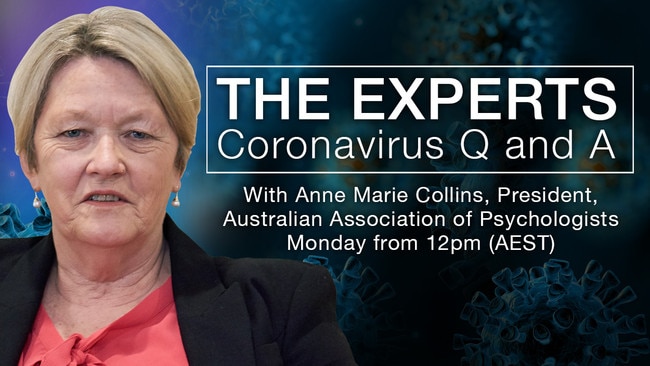Australian Association of Psychologists president Anne Marie Collins answers your questions
Edging closer to a life after the COVID-19 lockdown has many people are wondering how they will make the transition. Australian Association of Psychologists president Anne Marie Collins was online today to answer readers’ questions.

Hibernation
Don't miss out on the headlines from Hibernation. Followed categories will be added to My News.
- Contact tracing is the key to winning coronavirus war
- Classrooms must reopen now to avoid an ‘education divide’
WITH the promise of relaxed COVID-19 lockdown rules edging closer, Australians will be faced with plenty of challenges when it comes to returning to a ‘normal’ life.
Whether it is knowing how to explain the changes to children to help them adjust without causing fear, stress or anxiety, or knowing how to navigate the weeks ahead yourself, there is plenty think about and prepare for.
And as restrictions are eased, many people will be left to make their own decisions about how much or little they will interact with people outside their immediate family, being ever-mindful of the risks of second-wave outbreak of the virus.
The long-term effects on mental health from the coronavirus crisis might not be known for months. But there are already countless Australians struggling with financial pressures, unemployment or job uncertainty, and also facing an increased risk of domestic violence.
Ramped up telehealth services mean access to a psychologist has never been easier, no matter where you live in Australia.
President of the Australian Association of Psychologists Inc (AAPi), Anne Marie Collins, was online today to answer your questions.
Here’s what she had to say:
Q. I don’t feel ready to get back out there, and am actually really enjoying the self-isolation – should I be worried?
A. We know that people have different personality features that can contribute to some enjoying the isolation more than others. This is because some people are actually energised or greatly refreshed by having time alone, they tend to be introverts. Sometimes when they have not had much of that kind of time to themselves, they have not realised how enjoyable it can be and how much they might need it to feel restored. If you feel this way, you can use this opportunity to think about how you can build more of it into your daily life when you return to the workplace or the busy world.
Q. I have shared custody of my two daughters, six and nine. It has been very stressful coping with shared parenting during this lockdown and I am worried my kids aren’t coping. What warning signs should I be looking out for?
A. It is great that you are reflecting about what signs to look for – that says a lot about the care you have for your children. Generally with children when something about their behaviour is different, that can be a sign they are not coping and need more support. Things that might change are that if they are generally even-tempered but become more changeable in mood, or if they are generally very expressive but become more withdrawn. Other changes might be that where they usually sleep well, they are now having disturbed sleep. Appetite can be another sign of not coping so well. If they are normally eating well and either eating more or much less, that could be an indicator. If you do have concerns you can get support from a psychologist just to discuss the concerns first, and then be guided by them about whether anything more needs to be done.
Q. I have been getting treatment for domestic violence-related PTSD but stopped a month ago when I lost my job and couldn’t afford the fees. Is there a way I can see a psychologist and have it bulk billed?
A. It is great that you were receiving treatment for domestic-violence related PTSD, and important to continue especially at this time. Many psychologists will negotiate to bulk bill with existing or new clients when their circumstances change, and this can be done using telehealth. AAPi are actually calling on the government to increase the number of bulk-billed sessions available as was done during the recent Australian bushfires, and also asking that patients can self-refer without needing a GP referral. Until that happens, you can request a referral from a GP via telehealth, and then speak to your psychologist via telehealth – either as a phone call or video call.
A. There is a myth that mental health or any concerns that you have need to be bad before you see a psychologist. Sometimes it can help to just go to one session with a psychologist and see how you feel about that session before deciding about the psychologist. Talk with them about your feelings about seeing a psychologist and ask for their advice on getting a psychologist’s support in managing your concerns.
Q. I have two teenagers who are desperate to get out and see their friends, but I am certain all the social distancing messages will go out the window, especially if there is alcohol involved (one of them is 17 and I’m not naive to assume he doesn’t drink alcohol). They have been so good in the last few weeks staying home that I don’t want to be the ogre parent and keep them in for longer. What can I say to them to make sure they have got the message?
A. Teenagers usually respond best to a collaborative approach. That is, rather than telling them what to do, asking them about what they think would be the best approach for them to take when contact starts again. We know that the part of the brain that thinks about consequences is still developing in teenagers, and so using alcohol which hijacks that part of the brain even more so is a real risk. It can be helpful to be open and curious with them in the way you discuss it. Take an interest in what they think could happen. If you are struggling with how to convey to them that you care, seek some support from a psychologist experienced in working with teenagers.
Q. I have a friend who has been seeing a psychologist for over a year and she was able to keep seeing him using telehealth. I am feeling very anxious and think I should see someone but I don’t know where to start. How do I get access to a psychologist?
A. Anxious feelings are understandable during this time, and it will be very beneficial to speak with a psychologist who can help you process and manage these challenges and develop skills that will benefit you not only in these difficult times, but for all of life. The first place to go for a referral is to your GP, and you can actually do this via telehealth if you wish. They will create a mental health care plan and will refer you to a psychologist locally. You can also find a psychologist at www.aapi.org.au (go to the Find a Psychologist feature). A mental health referral from your GP allows you to see a psychologist of your choice, even if it names a particular psychologist.
Q. How do you think the lockdown will affect children in the long term? And how do we help them?
A. There will no doubt be lingering effects from the changes children have experienced during this period. There are some very helpful resources available online to assist children, such as www.mindfullittleminds.com and triplep-parenting.net.au If you have any concerns at all about changes in your children which are worrying you, see your GP and get a referral to a psychologist. Both your GP appointment and psychologist session can be completed using telehealth, which means talking over the phone or via a video call. Early intervention by an experienced and trained psychologist can help children with strategies to cope with COVID-19 and with other life challenges.
Q. I care for my son who has serious mental health issues and this lockdown has made him a lot worse. I have thought about taking him to hospital a few times but I keep hoping that when things return to normal he will be okay. What do you think?
A. When people have already been struggling with mental health issues it is incredibly important during a time of added stress such as during this lockdown that they maintain contact with their treating team. It is most important that he seeks help now and does not wait until the lockdown is over. The expectation is that the impacts of the COVID-19 lockdown and transitioning out of lockdown will have added mental health impacts on both people who have not suffered a mental health condition in the past as well as people with pre-existing conditions. A telehealth session with a psychologist on referral from a GP could be really helpful to your son.
You can read more answers in the comments below
Originally published as Australian Association of Psychologists president Anne Marie Collins answers your questions


